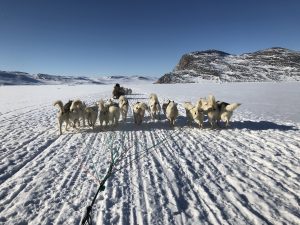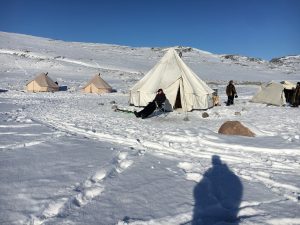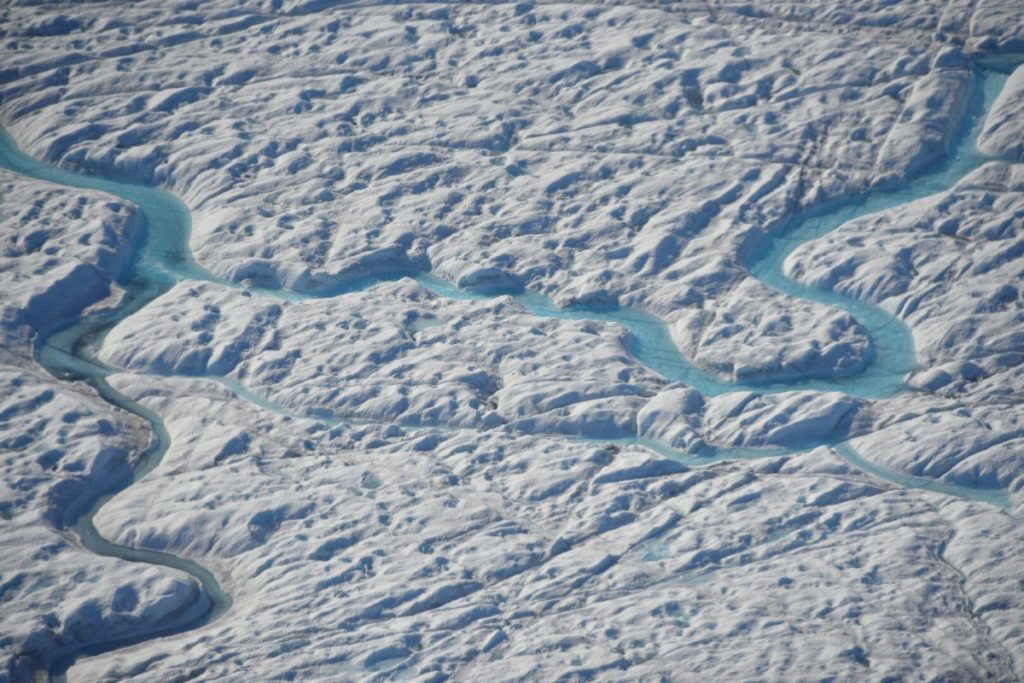Greenland is Melting and Coming to a City Near You
Having just returned from Greenland, it is very much on my mind. It is a wondrous and mysterious land. As I reflect on my week there, I can’t shake a popular phrase about Las Vegas, with a reverse twist. What happens in Greenland does not stay in Greenland.

In fact it brought back recollections of my first trips to the Arctic in 1985 and 87, when we dove under the polar ice, traveling from Resolute Bay to Ellesmere Island in Canada. Looking back the signs of unusual changes to weather and ice were noticeable, though we did not have the big picture as to “why.” While Canada might seem far from Greenland looking at a flat map, a globe-view makes clear that in the very high latitudes, as one gets closer to the North Pole, that the “horizontal distances” shrink dramatically. Essentially the Arctic is one place. Until recent times, the People of the Arctic were simply that – not of any particular nation. That is the meaning of their name, the “Inuit.”

- As the largest island on our planet, it is roughly the size of the United States, east of the Mississippi – about 1,600 miles north-south and a thousand miles east-west.
- With only 56,000 inhabitants, it is the least densely populated of all nations, with all the villages essentially on the coastal perimeter.
- Yet there are no roads between villages as more than 80% of the island is covered by an ice sheet averaging more than a mile thick.
- If it all melts, the ice and snow on Greenland will raise global sea level about 24 feet (7 meters) , though that will likely take many centuries, even at the current rate of warming.
- Almost 200 glaciers allow the ice sheet to “drain” to the sea, either as meltwater, or breaking off into icebergs.
(NOTE: Antarctica is in a different category as it is a Continent not an island, with no legal citizens or permanent residents.)
Those icebergs and meltwater entering the sea from Greenland are increasing year by year. Already they are the largest single source of rising sea level, causing greater flooding in coastal cities globally. That will almost surely rise in the next few decades as Greenland’s melt rate increases, which is happening exponentially. I should clarify that it is only when the icebergs or meltwater enter the sea from land, that sea level rises. Also to note, the common perception that melting icebergs and floating sea ice add to sea level is a misconception.

The top of the vast flat Greenland ice sheet is visibly melting after millions of years of stability.
Paradoxically, as Greenland melts, raising sea levels around the world, and moving coastlines inland, reducing landmasses and causing coastal flooding globally, it will not suffer the same effects, for a few surprising reasons:
- From a practical standpoint, Greenland stands to gain a lot more useable land as the ice melts and the sea rises. Most of Greenland has a steep, rocky shoreline. Even when sea level rises, it will not take much coastal land, so they do not associate higher sea level as a major threat to the coastline — in sharp contrast to relatively ‘flat’ areas like Florida, Bangladesh, Vietnam, and the Maldives, just to cite a few examples.
- They will actually GAIN much more useable land as the ice sheet retreats, land that has been covered by ice for thousands of years, land they will be able to use for farming, etc. So the net effect is that the melting ice creates more land for Greenland — the only nation in the world with that situation.
I had to recognize also that there were some real positives for Greenland in this new era. Given that Greenland is so cold most of the year and there is so much ice, at some level, many people on Greenland associate warming with more temperate, perhaps comfortable climate and in many ways, may not be such a bad thing. Eco-tourism is better than ever with thousands of people visiting this unique land of glaciers, icebergs, and much more. There are now careers for young people, something that was very scarce just a few years ago. I am not suggesting that they are glad the ice is melting due to climate change, but the specter of it is different than in most of the world. And to be clear, the impact on the indigenous cultures of the Greenlandic or Inuit people, is actually extremely disruptive in terms of their traditional way of life as hunters.
As important a role as Greenland has in raising sea levels, sometime in the coming years, Antarctica will overtake it in terms of impact on sea level rise. The southern continent holds seven times the ice as Greenland, enough to theoretically raise global ocean height about 185 feet (56 meters). For now, the melting of the glaciers on Antarctica are not nearly as advanced as Greenland. While there are thousands of experts monitoring Antarctica for signs of change, for the moment, ‘all eyes are on Greenland’ since that is where the melting ice is visible and bold.
Greenland may be remote and almost ignored by the vast majority of the world’s nations and people. Yet it is fairly accurate to say that Greenland is coming to a city near you in terms of its melting ice, raising global sea level. It strikes me as extremely ironic, that this remote island nation, being transformed by what is happening all over the world with climate change, will be sending a “little gift” of melted ice, to every coastal community – in the form of rising sea level.

